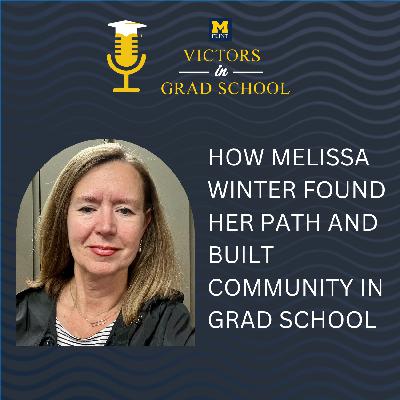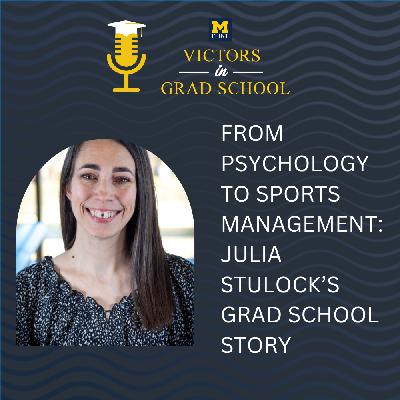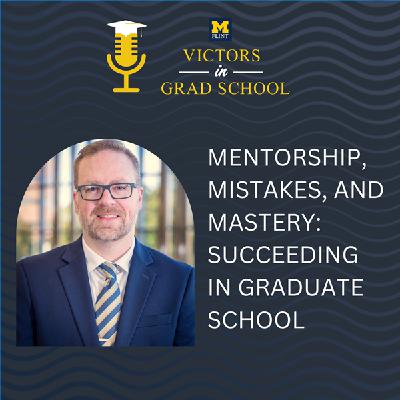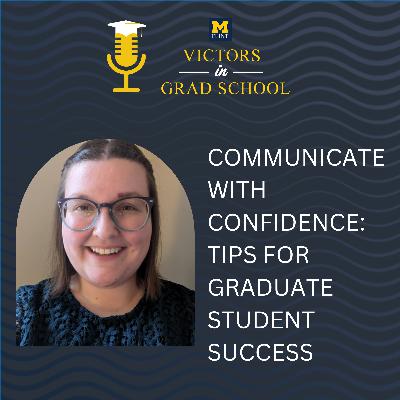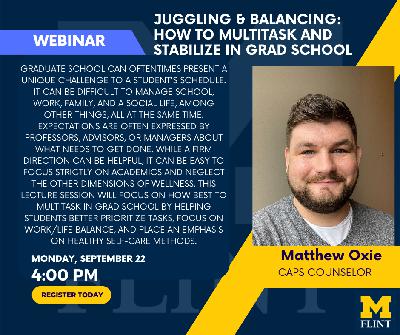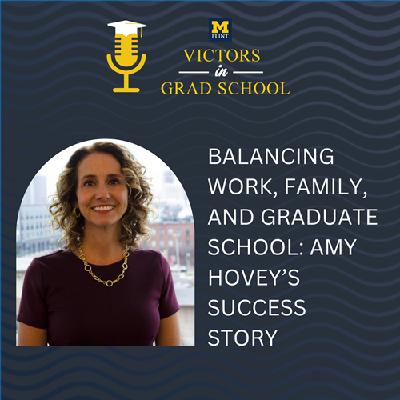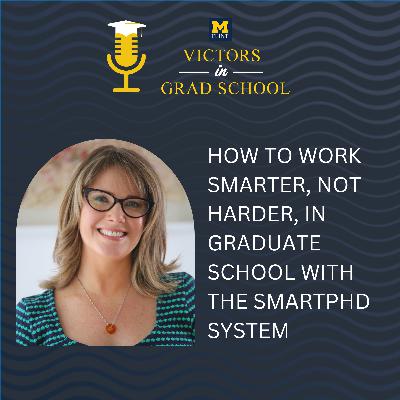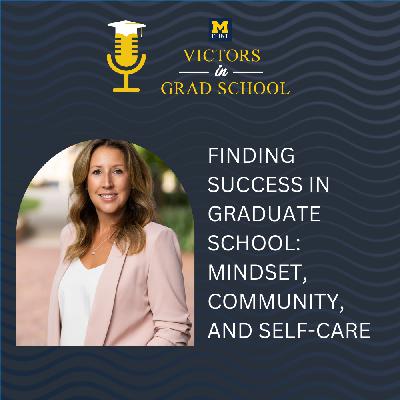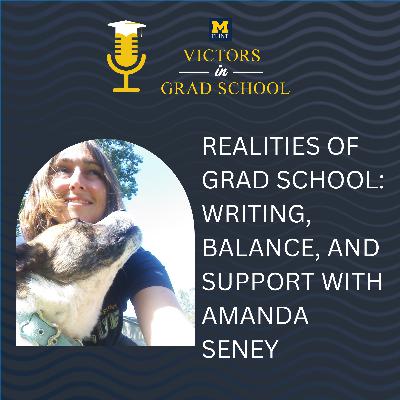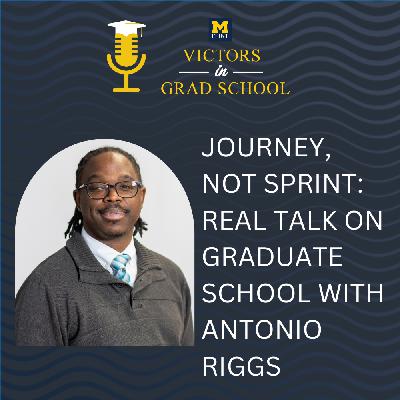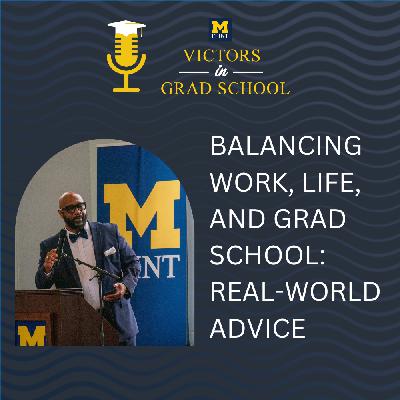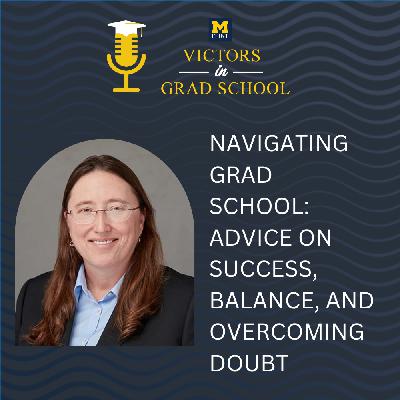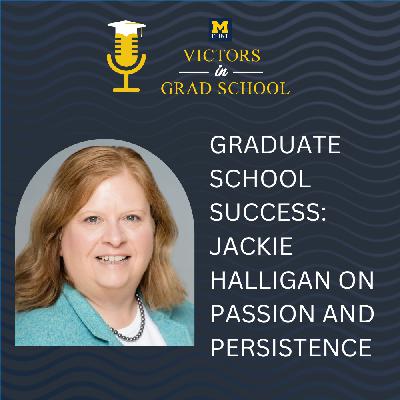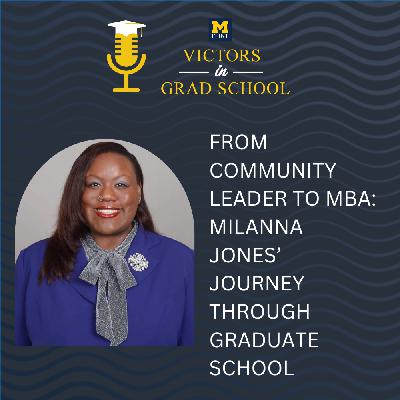How Melissa Winter Found Her Path and Built Community in Grad School
Description
Are you thinking about taking the next step toward a graduate degree, but feeling uncertain about what that journey might look like? On this week's episode of "Victors in Grad School," host Dr. Christopher Lewis sits down with Melissa Winter, Director of Housing and Dining at the University of Michigan-Flint, to discuss her distinct path through two graduate programs, the bumps along the way, and the keys to sustaining success as a student and professional.
Melissa's story begins with her undergraduate experience at Oakland University, where active campus involvement ignited her interest in higher education as a career. Yet, instead of jumping straight into grad school, she intentionally took a year off to reflect and thoroughly research programs, underscoring the importance of thoughtful decision-making rather than rushing into big commitments.
Her path led her to a master's in Higher Education and Student Personnel at Kent State University—a decision partly influenced by supportive mentors and the overall fit she felt with the campus and cohort. Later, after several years working (including living abroad for eight years!), Melissa pursued a second master's degree—this time, an online, accelerated MAT (Master of Arts in Teaching) program designed to help her transition careers and relocate to the United States. Even though she ultimately didn't pursue teaching, the experience provided clarity about her true passion for working with college students.
Throughout the episode, a few key themes shine through:
Resilience in the Face of Challenge—Melissa candidly shares how she struggled to find community and questioned her choices early in her first grad program. Thanks to thoughtful guidance from faculty, she stuck with it, ultimately finding her stride and forming lasting connections.
Adaptability and Time Management—Melissa discusses how graduate school taught her to be tremendously organized, balancing assistantships, coursework, and family. She found creative ways to collaborate with classmates, like turning commutes into productive work sessions, and prioritizing time for studies early in the mornings.
The Power of Community and Mentorship—Her advice for prospective grad students? Stay focused on your goals and actively seek out mentors and support networks. Success, she says, isn't just about high grades—it's about serving others and helping students thrive.
If you're contemplating grad school, Melissa's journey is a must-listen reminder that the path isn't always linear, but with grit, intention, and support, you can chart your own fulfilling course. Tune into the full episode for even more practical insights and inspiration!
TRANSCRIPT
Dr. Christopher Lewis [00:00:01 ]:
Welcome to Victors in Grad School, where we have conversations with students, alumni, and experts about what it takes to find.
Melissa Winter [00:00:08 ]:
Success in graduate school.
Dr. Christopher Lewis [00:00:11 ]:
Welcome back to Victors in Grad School. I'm your host, Dr. Christopher Lewis, Director of Graduate programs at the University of Michigan, Flint. Really excited to have you back again this week. You know, every week I love being able to have these conversations with you. I love being able to sit down, talk to you, and be able to take. To find ways that you can take information from these conversations and be able to turn it into something that is going to help you to be able to be even more successful in this journey that you're on. And I call it a journey because it truly is a journey.
Dr. Christopher Lewis [00:00:46 ]:
No matter if you are at the very beginning, just starting to think about, is graduate school right for me? Or if you applied, maybe you've gotten accepted, maybe you're in graduate school. No matter where you are, there are still things that you can do to be able to be successful one day at a time. And that's why this podcast exists. It's here to be able to help you on this journey that you're on, for you, to be able to learn from other people that have gone before you. You might learn some things that you're already doing, but hopefully you're going to be learning some new things that others have done before you that can help you along the way. Today we got another great guest. Melissa Winter is with us today. And Melissa is the Director of Housing and Dining at the University of Michigan, Flint.
Dr. Christopher Lewis [00:01:31 ]:
And she's her own journey that has led her to where she is today. And we're going to be talking about that journey today. So I'm really excited to have her here and to have her share some of her experiences. Melissa, thanks so much for being here today.
Melissa Winter [00:01:44 ]:
Yeah, no problem. Happy to help.
Dr. Christopher Lewis [00:01:46 ]:
So really excited to have you here. I know that. And I want to start today by turning the clock back in time. I know you did your undergraduate work at Oakland University, where you got a bachelor's degree in history and political science. But then at some point, at some point after being out of school for a little bit of time, you made a decision. You made a decision that you were going to go back to school and get a degree, a degree in higher education and student personnel. So I'd like to go back in time to that period of time. I want you to take me back to that moment, that moment that you figured out that you wanted to continue your education with a graduate degree.
Dr. Christopher Lewis [00:02:28 ]:
Bring me back to that point, what made you decide graduate school was the right step for you?
Melissa Winter [00:02:32 ]:
Well, it was something that I was considering during my undergraduate degree. I was a very involved student on campus and doing lots of different things. And so it was an interest area of mine. But because I was doing a lot on campus, serving in different leadership roles, felt like I needed a year away from school. So I started doing a job search more locally for some experiences and ended up landing a role in a school environment similar to what I ended up going into. But it allowed me the opportunity to take my time and really take a look at institutions, to look at programs, instead of just jumping in without thinking about it. So for me, taking that year off to really make a solid decision helped me.
Dr. Christopher Lewis [00:03:18 ]:
Now, I know you made the decision to attend Kent State University and to get a degree in higher education student personnel. And some of this decision might have been, like you said, that you were really involved. But I guess talk to me about the decision making of why you decided to go and get a degree in higher education student personnel, but also why Kent State University.
Melissa Winter [00:03:41 ]:
So I really believed, and I still do to this day, that students taking responsibility for their education and their own involvement is very important. There's a student development theory that is that talks about this. And so that was something that I really espoused to. So jumping into higher ed for me was something that I wanted to be able to contribute back to other students, to encourage them to get involved, take on opportunities as student leaders on their campuses. So that was part of my decision making process. And then in terms of Kent State, I actually did a pretty wide search for institutions. And I did have my dean of students at my undergrad did attend Kent State. And so he suggested it as an option for me to come consider.
Melissa Winter [00:04:25 ]:
And so it was one of the schools that I was considering when I went to visit there. There was a great coordinator that was leading the program at the time. And to be honest, it just felt like the most comfortable for me in terms of the other students that I was interacting with. It just had a great feel for me. And of course, I got an assistantship offer. So it all kind of just lined up and worked out. It was a good program for me.
Dr. Christopher Lewis [00:04:49 ]:
I'm going to delve a little bit into what you learned in that program, but I also know you decided down the road to get another master's degr. And I guess before we pivot too far off, you ended up down the road deciding to get a second master's degree after a number of Years of working. Not everybody would make that choice to go back to school after they get that master's degree. So bring me back to that point and why you made a decision that you wanted to add on and get a second Master's.
Melissa Winter [00:05:20 ]:
So I was actually at a point where I was considering either PhD work or doing something additional. And at the time I was living overseas and trying to find a way to return back to the United States. I'd been living overseas at that point for about eight years and learned of a master's program. It was a MAP program to teach essentially from another institution that I had worked at previously. And it was an accelerated program and thought it was something that seemed like a possibility to me and more of a guarantee for a job more easily, which was why I was considering it. And so it was a Master's in arts and teaching program and it allowed me to do it online. And so there was an opportunity for me to do that. And so that's why I jumped at doing that.
Melissa Winter [00:06:13 ]:
So I learned some things. I ended up not going into teaching. Like I learned some things about myself from that program. There were aspects that I did enjoy, but realized I

